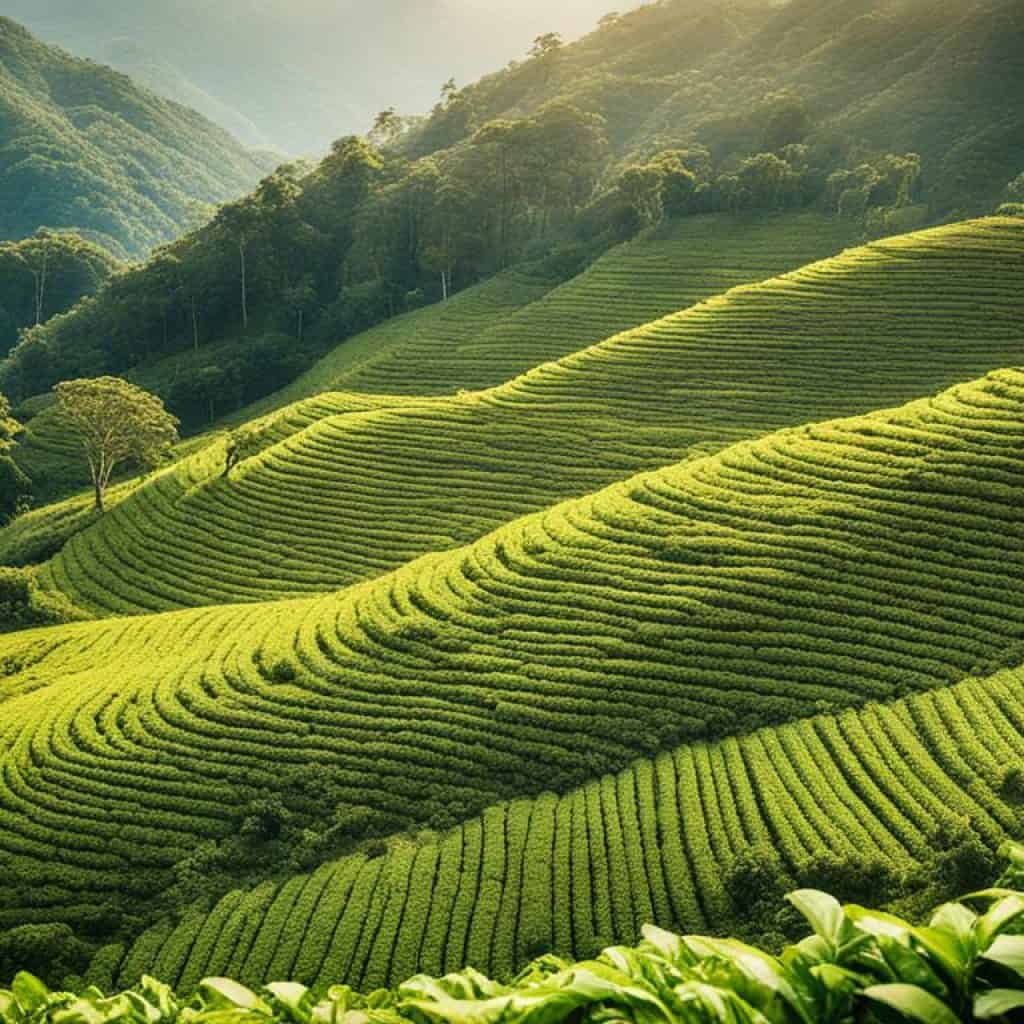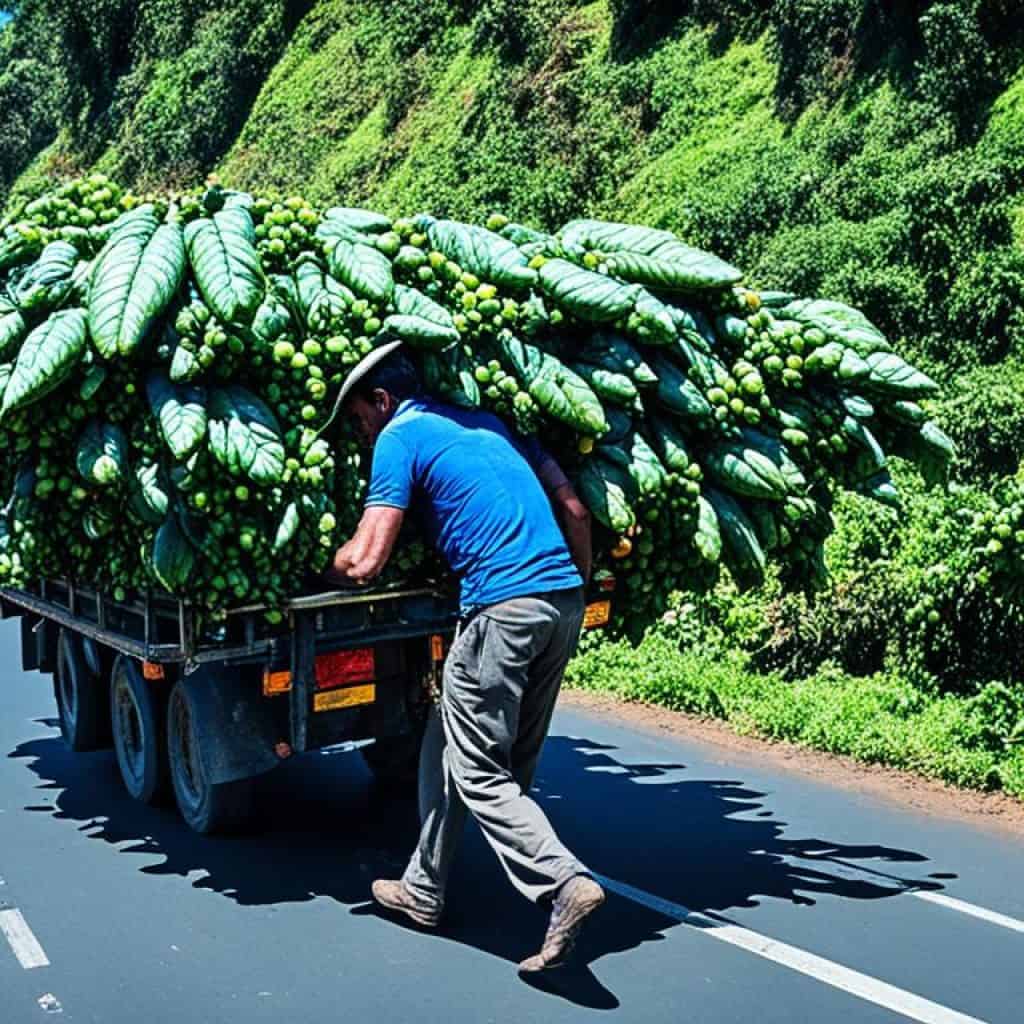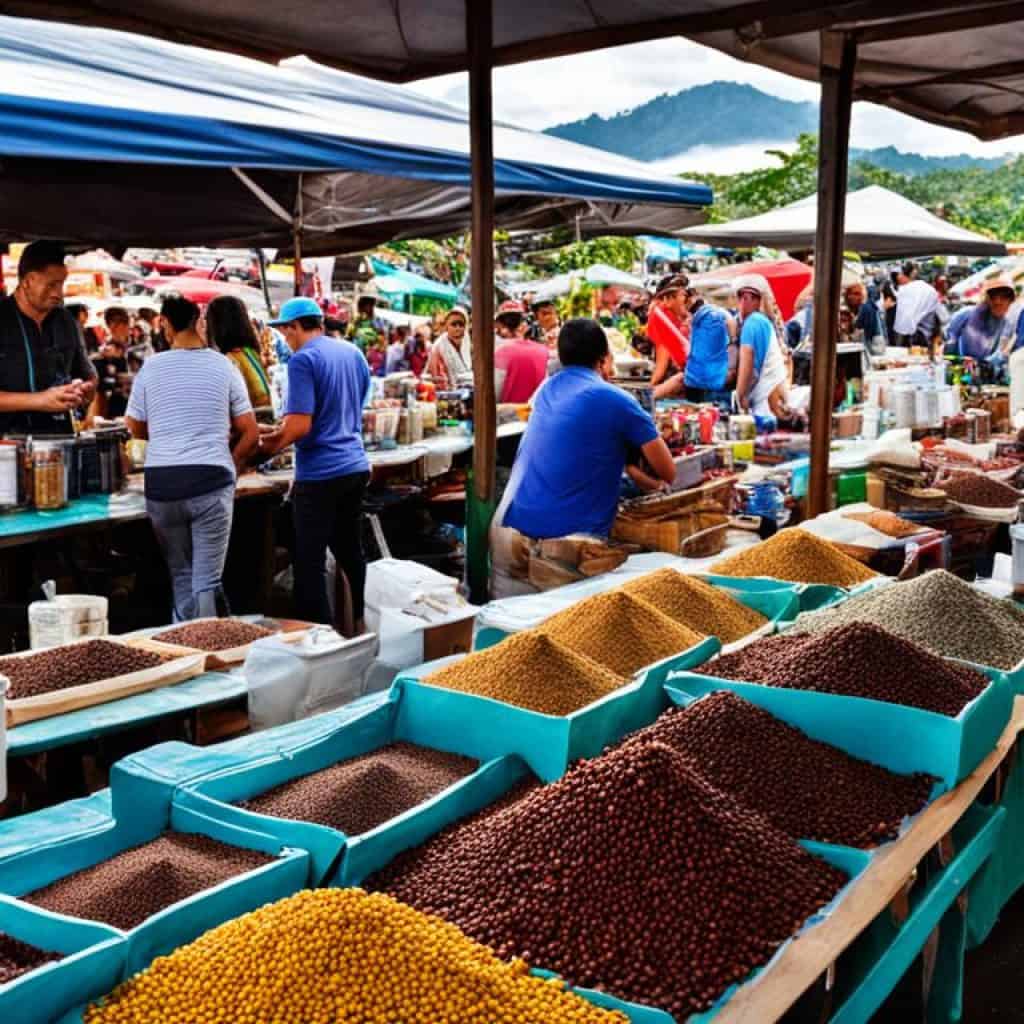When it comes to coffee, few regions can match the diverse and rich coffee culture of the Philippines. With its unique microclimates and a history steeped in coffee production, the country offers an array of quality coffee brands that cater to the discerning coffee aficionado. But which coffee brand reigns supreme in the Philippines? Is it the one you might have in mind or will it surprise you? Let’s dive into the world of Philippine coffee and uncover the top local coffee brands that are making waves in the industry.
Key Takeaways:
- The Philippines is a diverse coffee-growing region, known for producing all four major types of coffee – Arabica, Robusta, Liberica, and Excelsa.
- The country has a long history of coffee production but faced challenges that led to a decline in coffee exports.
- Despite these challenges, specialty coffee brands have emerged in Manila and other cities, offering high-quality and unique coffee options.
- The diverse climate in the Philippines provides optimal conditions for coffee cultivation, but climate change poses a threat to coffee farms.
- One unique and widely recognized coffee variety in the Philippines is Liberica, known locally as “Kapeng Barako.”
Now that you are aware of the rich coffee heritage of the Philippines, it’s time to explore the top coffee brands that are making a mark in the industry. Who will claim the title of the top coffee brand in the Philippines? Join us as we unravel the secrets of the Philippine coffee scene.
A Rich Coffee Variety in the Philippines
The Philippines is renowned for its rich coffee culture and diverse coffee varieties, making it a paradise for coffee lovers. What sets Filipino coffee apart is its authenticity and the wide range of flavors found in its premium coffee blends. Whether you prefer the boldness of Arabica, the robustness of Robusta, the uniqueness of Liberica, or the distinct character of Excelsa, the Philippines has it all.
The country’s unique growing conditions and microclimates contribute to the production of coffee beans with exceptional flavors and characteristics. From the fertile lands of Batangas to the majestic mountains of Cordillera and the vibrant fields of Mindanao, each region offers a distinct taste profile that truly captures the essence of authentic Filipino coffee.
| Coffee Variety | Flavor Profile | Region |
|---|---|---|
| Arabica | Smooth, fruity, and floral | Cordillera Mountain Range (Benguet, Sagada, Kalinga) |
| Robusta | Full-bodied, bold, and earthy | Mindanao |
| Liberica | Strong, sharp, with hints of aniseed | Batangas |
| Excelsa | Complex, fruity, and nutty | Selected regions across the Philippines |
Each cup of Filipino coffee tells a story—a story of dedication, meticulous cultivation, and a deep-rooted passion for the craft. Whether you’re brewing a cup at home or visiting a local café, indulging in the premium coffee blends of the Philippines promises a delightful and unforgettable experience.
“Filipino coffee epitomizes the essence of a rich coffee culture, offering an unparalleled taste that satisfies coffee aficionados worldwide.”
Historical Factors Impacting Philippine Coffee Production
The rich history of coffee in the Philippines dates back to the 18th century when it was introduced by Spanish colonists. By the late 1800s, the country had become the world’s fourth-largest exporter of coffee, with its flavorful beans gaining recognition internationally. However, the coffee industry faced significant setbacks at the end of the 19th century, leading to a decline in production.
The arrival of coffee rust and insect infestations took a toll on coffee plantations, causing a sharp decrease in yields. As a result, the Philippines, once a major player in the global coffee market, saw its rankings drop significantly. Today, the country is ranked 33rd in terms of coffee production worldwide.
Despite this setback, the Philippine coffee industry is experiencing a resurgence, with the emergence of specialty coffee brands in Manila and other cities. These companies are focused on offering high-quality, unique, and distinct coffee options to cater to the growing demand for specialty coffee.
The Rise of Specialty Coffee Brands in Manila
The specialty coffee movement in Manila has gained traction over the years, with coffee enthusiasts embracing the diverse flavors and unique characteristics of locally sourced beans. Popular coffee companies in the Philippines, such as Philippine Coffee Company and Kape Republic, have become go-to destinations for specialty coffee lovers seeking exceptional brews.
These specialty coffee brands in Manila are dedicated to showcasing the best of Philippine coffee, sourcing beans from different regions and elevating the coffee drinking experience. They carefully select and roast the beans to highlight the distinct flavors, aromas, and profiles unique to each variety, allowing customers to explore the rich coffee heritage of the Philippines.
Furthermore, these specialty coffee brands prioritize sustainability and ethical sourcing, supporting local farmers and promoting fair trade practices. By establishing direct relationships with coffee growers, they ensure that the farmers receive fair compensation for their hard work, contributing to the overall growth and development of the Philippine coffee industry.
Unlocking the Unique Flavors of Philippine Coffee

Exploring the offerings of specialty coffee brands in Manila allows coffee enthusiasts to delve into the diverse range of flavors and profiles that local coffee has to offer. From the fruity and floral notes of Arabica beans to the bold and robust character of Robusta, each cup tells its own story, representing the rich heritage and culture of the Philippines.
| Coffee Company | Location | Specialty Coffee Blends |
|---|---|---|
| Philippine Coffee Company | Manila | Batangas Barako, Benguet Arabica, Sagada Dark Roast |
| Kape Republic | Manila | Barako Blend, Philippine Civet Coffee, Excelsa |
| Coffee Origins | Manila | Sulu Specialty Blend, Sultan Kudarat Arabica, Tawi-Tawi Liberica |
These specialty coffee brands in Manila meticulously source their beans from specific regions known for producing exceptional coffees. This attention to detail allows coffee enthusiasts to savor the uniqueness of Philippine coffee and experience the varied flavors and profiles that each blend offers.
By supporting these specialty coffee brands, consumers not only enjoy a valuable coffee experience but also contribute to the growth and sustainability of the Philippine coffee industry. It is through these initiatives that the historical influence on Philippine coffee production continues to shape the present and future of the industry.
Climate’s Role in Philippine Coffee Growing
The unique and diverse climate of the Philippines plays a crucial role in the cultivation of coffee. With a combination of ample sun, abundant rainfall, and favorable temperatures, the country provides optimal conditions for coffee plants to thrive and produce high-quality beans.
However, the geographical makeup of the Philippines, consisting of thousands of exposed islands, exposes the coffee farms to the impact of climate change. In recent years, the frequency and severity of typhoons have increased, posing a significant threat to the coffee-growing regions.
These tumultuous weather conditions have caused substantial damage to coffee farms, disrupting production and affecting the livelihoods of coffee producers. Despite these challenges, organic coffee producers in the Philippines remain committed to upholding stringent quality standards and sustainable practices to protect the environment and ensure the long-term viability of the industry.
By embracing organic farming methods, these producers prioritize the cultivation of coffee without the use of synthetic pesticides, herbicides, or fertilizers. This commitment to organic practices not only preserves the natural ecosystems but also guarantees the production of coffee free from harmful chemicals, offering a healthier and more environmentally friendly choice for consumers.
The Importance of Organic Coffee Producers in the Philippines
Organic coffee producers in the Philippines play a vital role in preserving the country’s rich coffee heritage while promoting sustainable agriculture. By cultivating coffee beans in a manner that respects the environment, these producers contribute to the conservation of biodiversity and the protection of natural resources.
“Organic coffee production in the Philippines is not only about growing high-quality beans. It is a commitment to environmental stewardship and sustainable livelihoods for coffee farming communities.”
By supporting organic coffee producers in the Philippines, consumers can make a conscious choice to reduce their ecological footprint while enjoying the rich flavors and aromas of specialty coffee. With every sip, they contribute to the preservation of the unique Philippine coffee culture and support the dedicated farmers who work tirelessly to bring exceptional coffee to their cups.
| Benefits of Organic Coffee |
|---|
| 1. Environmental conservation |
| 2. Protection of natural resources |
| 3. Support for sustainable livelihoods |
| 4. Healthier choice for consumers |
By choosing organic coffee from the Philippines, consumers not only indulge in a delightful coffee experience but also contribute to a greener and more sustainable future. Supporting organic coffee producers is a way to align personal values with sustainable consumption, making a positive impact on both the environment and the livelihoods of Filipino coffee farmers.
Philippine Liberica – A Unique Coffee Bean
Liberica, known locally as “Kapeng Barako,” is a unique coffee variety exclusively grown in the Philippines. While it may not be as widely exported as other coffee beans, its popularity among locals is undeniable. Kapeng Barako is cherished for its bold and strong flavor, accompanied by a sharp aroma that often evokes the essence of aniseed.
Despite being a small fraction of the overall coffee beans grown in the Philippines, Liberica has gained international recognition and become a symbol of Filipino coffee culture. Its distinct characteristics and rich history have piqued the curiosity of coffee enthusiasts worldwide.
When it comes to experiencing the uniqueness of Liberica, several specialty coffee brands in Manila offer dedicated Liberica coffee options. These brands recognize the value of this exceptional Philippine coffee bean and allow coffee aficionados to explore its exquisite flavors.
Challenges in the Philippine Specialty Coffee Industry
The specialty coffee industry in the Philippines faces significant challenges that hinder its growth and development. Two key obstacles that the industry must overcome are the lack of infrastructure and the need to improve coffee quality.
Firstly, the importation of coffee from other countries such as Vietnam and Indonesia poses a significant threat to the local industry. Imported coffee is priced lower than locally produced coffee, making it more affordable and appealing to consumers. This competition from imported coffee affects the market demand for Philippine specialty coffee, making it difficult for local coffee businesses to thrive.
Secondly, there is a deficiency in the necessary infrastructure to support the specialty coffee industry. The lack of warehouses and processing stations limits the industry’s ability to control the quality of coffee production and implement improvement strategies. Without proper facilities to process, store, and distribute coffee, it becomes challenging to maintain consistent and high-quality coffee across the value chain.
However, despite these challenges, there is hope on the horizon for the Philippine specialty coffee industry. The Philippine government, in collaboration with non-governmental organizations (NGOs), is actively working towards improving the quality of coffee through farmer support and education initiatives. By providing better resources, training programs, and financial assistance, the government aims to empower local coffee farmers and raise the overall quality standards in the industry.
“Investing in infrastructure and supporting coffee farmers are pivotal steps towards overcoming the challenges faced by the Philippine specialty coffee industry. By addressing these issues, we can nurture a thriving coffee ecosystem that delivers exceptional and sustainable coffee to both domestic and international markets.”
Through these efforts, the industry aims to demonstrate its potential and establish the Philippines as a reputable source of high-quality specialty coffee. As the industry evolves and adapts, it will continue to contribute towards the growth and development of the Philippine coffee sector, benefiting both coffee farmers and coffee enthusiasts alike.

Major Coffee-Growing Regions in the Philippines
The Philippines boasts several coffee-growing regions, each contributing to the country’s rich coffee diversity. Let’s explore the major coffee-growing regions in the Philippines and the unique characteristics they offer.
Batangas: The Coffee Capital of the Philippines
Batangas, known as the “Coffee Capital of the Philippines,” is famous for its vibrant coffee culture and the production of the unique Liberica coffee variety. Liberica, also known as “Barako” coffee, is grown in Batangas and has a distinct full-bodied flavor with hints of nuttiness and a strong aroma. This variety is rarely exported, making it a treasure for local coffee enthusiasts.
The Cordillera Mountain Range: Home to Top-Quality Arabica Beans
The Cordillera Mountain Range, including regions such as Benguet, Sagada, and Kalinga, is renowned for producing top-quality Arabica beans. The cool climate, high altitude, and fertile mountain slopes create optimal conditions for growing Arabica coffee with its delicate flavors, pleasant acidity, and floral notes. These regions showcase the importance of microclimates in influencing coffee flavors.
Mindanao: The Hub of Robusta Beans in the Philippines
Mindanao, one of the largest islands in the Philippines, is responsible for 70% of the country’s coffee production and is known for its abundant Robusta beans. Robusta coffee thrives in the lowlands and humid environments, making Mindanao an ideal region for its cultivation. Robusta beans offer a stronger and richer flavor profile as well as a higher caffeine content, which contributes to their popularity in local and international coffee blends.
Overall, these coffee-growing regions showcase the diverse range of flavors and characteristics found in Philippine coffee. From the unique and treasured Liberica in Batangas to the delicate Arabica beans in the Cordillera Mountain Range and the robust Robusta beans in Mindanao, each region adds its own special touch to the Philippines’ vibrant coffee industry.
| Region | Coffee Variety |
|---|---|
| Batangas | Liberica (“Barako”) |
| Cordillera Mountain Range | Arabica |
| Mindanao | Robusta |
Coffee Culture and Consumption in the Philippines
The Philippines has developed a vibrant coffee culture, with a significant increase in coffee consumption in recent years. Filipinos have a deep appreciation for coffee, evident in their daily consumption of approximately 170,000 tonnes of coffee annually. As the country embraces the growing coffee trend, there is a projected increase in coffee consumption in the coming years.
The rise of third-wave coffee shops in urban centers is a testament to the growing demand for higher quality and specialty coffee in the Philippines. These new establishments focus on the entire coffee experience, from sourcing beans directly from farmers to carefully crafting each cup of coffee. They prioritize factors such as bean origin, sustainable practices, and artisanal brewing methods, offering a more refined and elevated coffee experience.
This shift towards specialty coffee demonstrates the increasing recognition of local coffee and challenges the dominance of instant coffee in the Filipino market. While instant coffee still holds a significant portion of the market share, there is a strong interest in exploring unique flavors, single-origin coffees, and brewing techniques, fueling the growth of the specialty coffee segment in the country.
“The emergence of third-wave coffee shops in the Philippines signifies a cultural shift towards appreciating coffee as more than just a morning pick-me-up. It has become a lifestyle choice, allowing coffee enthusiasts to savor the distinct flavors and aromas of carefully sourced and expertly roasted beans.”
The Philippines’ coffee culture is also driven by the community aspect of coffee consumption. Coffee shops have become social hubs where friends and colleagues gather to connect, relax, and enjoy a cup of coffee together. This communal experience contributes to the overall enjoyment and appreciation of coffee, fostering a sense of community among coffee lovers.

The Potential of the Philippine Coffee Industry
Despite current challenges, the Philippine coffee industry has enormous potential. With its diverse growing regions and the increasing interest in rare coffee varieties like Liberica and Excelsa, the Philippines could become a significant player in the global coffee market. Efforts are being made to improve quality, infrastructure, and support for local coffee farmers. As the industry continues to grow and evolve, there is optimism for the Philippines to establish itself as a prominent coffee destination.
Exploring Rare Coffee Varieties
The unique coffee varieties cultivated in the Philippines set it apart from other coffee-producing countries. The country’s rich biodiversity allows for the growth of rare coffee types such as Liberica and Excelsa. These distinct beans possess flavors and aromas that appeal to coffee connoisseurs seeking something extraordinary. The increasing interest in these rare coffee varieties opens up new opportunities for the Philippine coffee industry to expand its market presence.
“The growing interest in rare coffee varieties like Liberica and Excelsa signifies a shift in consumer preferences. People are becoming more adventurous in their coffee choices and are willing to explore flavors that go beyond the usual. This presents a chance for the Philippine coffee industry to showcase its unique offerings and gain recognition on a global scale.”
Commitment to Quality and Sustainability
The Philippine coffee industry is actively working towards improving the quality of its coffee beans. Farmers are adopting sustainable farming practices, including organic cultivation methods, to enhance the overall taste and appeal of Philippine specialty coffee. Additionally, there is a growing emphasis on establishing direct trade relationships between coffee farmers and buyers, ensuring fair prices and supporting the long-term sustainability of the industry.
Investing in Infrastructure and Support
To fully realize its potential, the Philippine coffee industry recognizes the need for better infrastructure and support systems. Investments are being made in establishing modern processing facilities, post-harvest technologies, and transportation networks to streamline the coffee supply chain. Additionally, government initiatives and collaborations with international organizations aim to provide training and resources to farmers, empowering them with the knowledge and skills needed to produce high-quality coffee.
Furthermore, efforts are underway to promote Philippine specialty coffee through domestic and international marketing campaigns. These initiatives aim to raise awareness about the unique flavors and characteristics of Philippine coffee, attracting coffee enthusiasts and creating a strong market presence in the global coffee industry.
Future Outlook
With its diverse coffee varieties, commitment to quality and sustainability, and ongoing efforts to improve infrastructure and support systems, the Philippine coffee industry is poised for growth. As consumer preferences continue to shift towards specialty and unique coffee offerings, the Philippines has the ingredients to become a major player in the global coffee market. By harnessing its potential and capitalizing on its rich coffee heritage, the Philippine coffee industry can secure its position as a prominent coffee destination.
Conclusion
The coffee culture in the Philippines is thriving, thanks to its rich and diverse coffee heritage. With its unique coffee varieties and growing regions, the country offers a sensory delight for coffee enthusiasts. Despite facing challenges such as competition from imported coffee and limited infrastructure, the local coffee industry has managed to make significant progress in producing high-quality and specialty coffee.
There is a growing interest in Philippine coffee both domestically and internationally, indicating its potential to make a mark in the global coffee market. As the industry continues to grow and improve, coffee lovers can look forward to indulging in the authentic flavors of Filipino coffee brands and experiencing the distinctive characteristics that make them stand out.
From the traditional Kapeng Barako to the specialty blends crafted by indigenous coffee farmers, Coffee Brand In The Philippines offer a delightful range of flavors and aromas. The country’s coffee producers are dedicated to maintaining the unique qualities of their coffee, promoting sustainability, and supporting local communities. As Philippines continues to navigate the challenges and capitalize on its strengths, it is poised to establish itself as a prominent player in the global coffee scene.


















Add comment